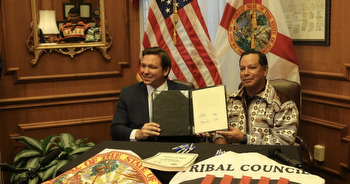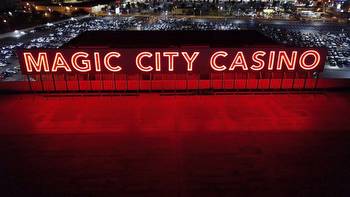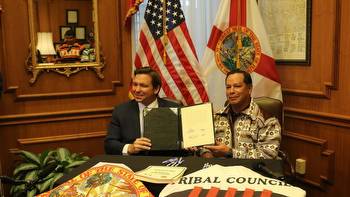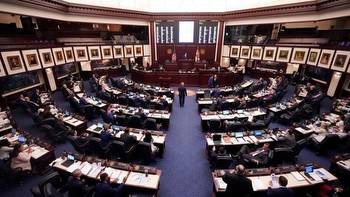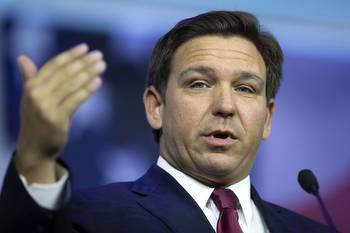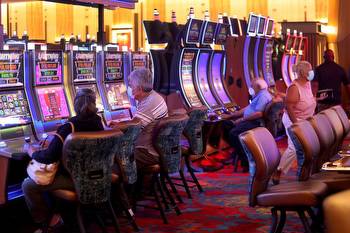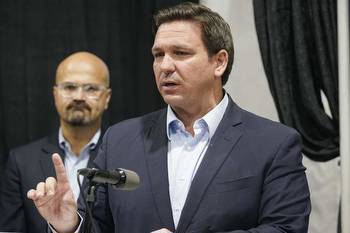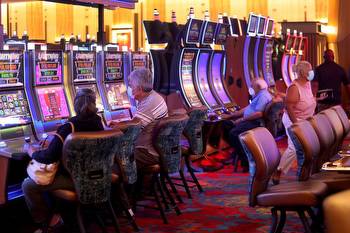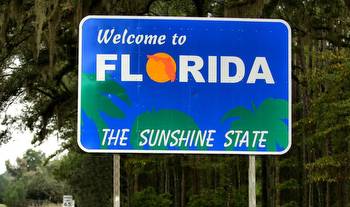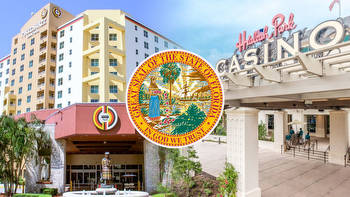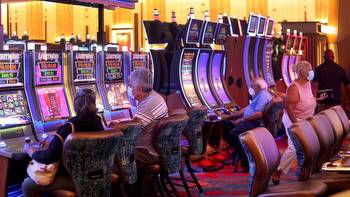Feds urge court to reverse invalidation of Florida’s gambling compact with Seminole Tribe

TALLAHASSEE — Lawyers for the federal government asked a federal appeals court on Wednesday to reverse a ruling that invalidated Florida’s attempt to give the Seminole Tribe a monopoly on sports betting in the state.
A three-judge panel on the U.S. Court of Appeals for the District of Columbia Circuit heard arguments from lawyers for the U.S. Department of Interior, the State of Florida, the Seminole Tribe and the plaintiffs — West Flagler Associates, which owns Magic City Casino and Bonita Springs Poker Room near Naples. The case could influence how agreements with sovereign tribes are handled in the future.
At issue is whether Secretary of Interior Deb Haaland, whose agency oversees tribal gambling, acted within her authority under the Indian Gaming Regulatory Act when she took no action last year and let the gambling agreement between the Seminole Tribe of Florida and Gov. Ron DeSantis take effect. That act is the federal law that regulates gambling on Indian lands.
Under the 30-year agreement approved by the Florida Legislature, the Seminoles agreed to pay the state at least $2.5 billion over the first five years of the deal in exchange for having control over sports betting in the state and being allowed to add roulette and craps to the tribe’s casino operations.
To get around a constitutional amendment that prohibits the expansion of gambling outside of tribal land without voter approval, the agreement — known as the gaming compact — requires the tribe to operate a so-called hub-and-spoke model for sports betting. The process moves all online sports bets from players located outside of tribal lands through the tribe’s servers.
Opponents argued the agreement was an attempt to use federal Indian gaming law as way to authorize sports betting in Florida by circumventing the state law that prohibits the expansion of gambling without voter approval, as is required under the constitutional amendment approved by Florida voters in 2018.
The owners of Magic City Casino and Bonita Springs Poker Room — West Flagler Associates — and a group of plaintiffs that includes No Casinos and Miami businessmen and gambling opponents Armando Codina and Norman Braman, each filed separate lawsuits against Haaland alleging that the federal government improperly approved the gaming compact.
The original ruling
In a blow to the DeSantis administration, Judge Dabney L. Friedrich of the U.S. District Court in the District of Columbia agreed with the plaintiffs in November 2021, and invalidated the deal.
She concluded that the tribe’s sports betting and casino expansion violated federal Indian gaming law and that Haaland erred in allowing the deal to go forward because the Indian Gaming Regulatory Act requires that any state-sanctioned gambling must occur on tribal land.
Political editor Emily L. Mahoney will send you a rundown on local, state and national politics coverage every Thursday.
“Although the compact ‘deem[s]’ all sports betting to occur at the location of the Tribe’s ‘sports book[s]’ and supporting servers ... this court cannot accept that fiction,” Friedrich wrote. “When a federal statute authorizes an activity only at specific locations, parties may not evade that limitation by ‘deeming’ their activity to occur where it, as a factual matter, does not.”
The tribe immediately appealed and, last December, the appellate court dealt it another blow and ruled that the tribe had not shown that it would be irreparably harmed if the tribe is forced to halt its sports book operation while the appeal moves through the courts.
The arguments in the appeal hearing
During the two-hour hearing on Wednesday, Rachel Heron, attorney for the Department of Interior, defended Haaland’s decision and argued that “the secretary acted lawfully here and the district court’s conclusion was based on an error of federal contract law interpretation.”
Heron argued that while the secretary of the interior “has a duty” to make sure the compact does not violate federal Indian gaming law, she does not have a duty to make sure that it does not violate state law.
The federal statute that regulates tribal gaming “does not even list non-compliance with state law as the ground on which the secretary has authority to disapprove a compact,” Heron said.
She urged the judges to reinstate the agreement and allow the tribe to return to collecting bets outside of Indian lands.
But Hamish Hume, of Boies Schiller and Flexner LLP, who represents West Flagler, argued that the tribe’s gambling agreement with the state cannot legalize gambling activity unless the activity is on tribal land.
“There’s nothing in (the Indian Gaming Regulatory Act) that could allow for such a brazen recharacterization of the actual facts,” he said.
He suggested that the federal government was “trying to have it both ways,” by asking this court to reverse the lower court ruling “while they say in their legal briefs that (the Indian Gaming Regulatory Act) cannot authorize gambling off Indian lands.”
He urged the court to reject the argument that the secretary of the interior can approve an agreement that contradicts state law.
“Don’t give them the imprimatur of (Indian Gaming Regulatory Act) approval, because they will use that to say that it satisfies state law,” he said.
Hume pleaded with the court that if it wants to reverse the lower court ruling and allow the agreement to take effect, “make it crystal clear that the order says this secretary’s approval does not in any way authorize the gambling if takes place off Indian land.”
The tribe’s point of view
But Barry Richard, the lawyer for the Seminole Tribe, argued that the federal act “was not supposed to restrict gambling to Indian land but was to restrict the states from regulating gambling on Indian lands.”
“IGRA was intended to encourage the states and the tribes to enter into agreements precisely like this one,” he said.
Last year, Hume told the lower court that West Flagler Associates was being economically harmed by the competition from the sports betting operation. He said that four days after the Seminole Tribe began a soft launch of its online sports betting app, West Flagler Associates saw a 35% drop in its daily wagers.
Since then as the tribe has been forced to suspend sports betting, West Flagler has reached an agreement with the Poarch Band of Creek Indians, an Alabama-based Native American tribe, to sell its operation and transfer its lucrative gambling permit at Magic City Casino to the Poarch tribe for an undisclosed price.
The decision to transfer the permit must be approved by the Florida Gaming Control Commission. The decision was postponed until Dec. 19 as regulators wanted more information to be provided to the public.
Federal District Court Judge Robert L. Wilkins, who presided over the hearing with Judges Karen LeCraft Henderson and J. Michelle Childs, said the court would take the appeal “under advisement,” meaning it is reserving judgment while it considers a ruling.










